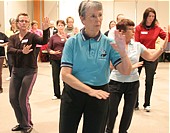Working with a Teacher
| By: Dr Paul Lam and Nancy Kaye |
Sooner or later, if you’re to progress to a higher level, you’ll realize that you’ll need a teacher. Face-to-face instruction from a suitable teacher can enhance your tai chi immeasurably. On the other hand, an unsuitable teacher can set you back. People we know have given up tai chi because they’ve had unsuitable teachers. So take your time to find a teacher with whom you resonate with and who will meet your needs. A good teacher should be able to guide you no matter what stage you’re at in tai chi. If your new teacher starts by saying, “Everything you’ve learned thus far is all wrong, you’ve wasted your time”, consider looking for another teacher.
When you visit a class, watch the students, and if possible talk to them. Do they seem interested? Enthusiastic? Do they ask the teacher questions and get a satisfactory response? Are their objectives similar to yours? Are there regular students? A UK tai chi instructor, Margaret Brade, provided this fine explanation of why she thought so highly of her teacher: “I still went back to him as he had some magic for me – and many others. It is hard to capture in words what someone has what makes 30-plus people turn up twice a week, week after week – all those instructors that have come after him (he has now retired) have not managed it and people still constantly talk of Bruce.” If you had visited Bruce’s class, you would have seen many regular students and enjoyed a great atmosphere. Does the teacher care about injury prevention? Are warm-up and cooling-down exercises part of the teaching? Is the teacher more interested in martial art or health? Finding a teacher might be more difficult for those of you who live in small towns. You might have to resort to taking workshops or using instructional DVDs and books rather than attending ongoing classes. However, in addition to regular home-based classes, many excellent tai chi teachers travel around the world giving workshops and courses. You can find out about these courses, or workshops, online. In the tai chi world, it’s not uncommon to come across teachers who teach in what’s called a “traditional manner” – in other words, they are from the “old school”. Many such teachers expect their students to learn simply by following them doing the forms, and don’t provide any instructions or hands-on assistance or even individual attention. They may even discourage two-way communication or be negative towards a student’s progress. Some traditional teachers also demand total loyalty; in other words, you’re not allowed to obtain instruction from another person or even from materials such as books and DVDs. Nowadays, however, these teachers are becoming more rare. This isn’t to say that the traditional-style teacher is all bad. Many traditionally-oriented teachers have much to offer. Whether you opt for this kind of instruction depends on your understanding, tolerance, how you learn best and whether you have any choice.  Making the most of classes Making the most of classesOnce you decide on studying with a teacher, you can get more out of your classes by keeping the following suggestions in mind.
There may come a time when you feel you’ve learned as much as you can from your teacher. Perhaps it’s time for you to make a change. Don’t feel guilty. Each teacher has something different to offer. Why not take advantage of that fact? Simply let the teacher know in a respectful way, show your appreciation, and be honest about why you are leaving. Related articles: back to the top |


 If you live in a fairly large community, chances are you won’t have much trouble locating a few teachers. There is a list of Dr Lam’s
If you live in a fairly large community, chances are you won’t have much trouble locating a few teachers. There is a list of Dr Lam’s